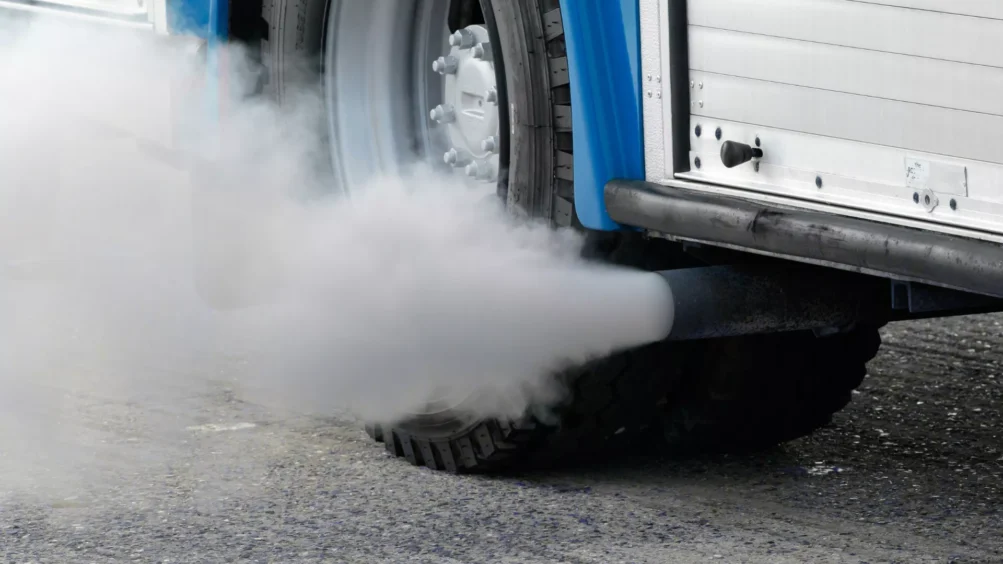
Achieving Sustainability in the Trucking Industry
According to statistics, the trucking industry transports nearly 12 billion tons of freight annually, accounting for 72% of the economy’s total tonnage. Taking into account the carrying capacity of an average truck and even the fact that emissions from new trucks have been reduced by over 98% in the last three decades, it is not hard to imagine its environmental impact and, therefore, the importance of achieving sustainability within the industry. However, sustainability in trucking is not only about environmental impact and reducing carbon footprint; it’s also about achieving high operational efficiency and fostering customer loyalty.
Defining Sustainability in Trucking
While sustainability in the trucking industry primarily aims to reduce the environmental impact of freight transportation, it also ensures economic viability and social responsibility by employing a holistic approach to business operations.
Key elements of sustainability in trucking:
- Environmental sustainability
This is what everyone in the trucking business refers to when talking about sustainability. It involves reducing the carbon footprint, which remains one of the most significant pollution factors.
- Economic sustainability
This is a critical factor for a trucking company. To sustain its operations, it must be profitable, which requires finding a balance between reducing emissions and maintaining economic viability.
- Social sustainability
This focus is on fair labor practices and safe working conditions for employees. It also includes community outreach and support, which are integral to the trucking industry’s social responsibility.
- Resiliency
Businesses must ensure their trucking operations can withstand and adapt to major disruptions. They must also plan for and mitigate risks that could impact the business.
- Adaptability
The ability to adjust operations in response to changing regulations and market demands is vital. For example, the move towards electric vehicles and alternative fuels requires significant adaptability.
Environmental Sustainability
Achieving environmental sustainability involves implementing a variety of practices and strategies that target emissions reduction. It can’t be granted by just using more fuel-efficient vehicles, at least not in the near future.
Truckers rely on technology achievements to achieve their sustainability goals, specifically, telematics systems providing real-time data on vehicle performance, fuel consumption, and driver behavior. These data then allow fleet managers to identify weak areas where fuel efficiency can be improved, helping them lower emissions.
Implementing driver training programs is no less critical. Educating drivers on eco-friendly driving practices, such as reducing idling time and maintaining optimal speeds, can significantly cut down fuel consumption. According to Craig Maris, the executive vice president of transportation and cold chain at ERO, optimizing driver behavior can save up to 25-30% emissions.
Route optimization and investing in aerodynamic technologies are also beneficial. By using advanced route planning software, trucking companies can minimize the distance traveled and reduce fuel consumption. On the other hand, simple modifications like side skirts, fairings, and wheel covers can also reduce air resistance and improve fuel efficiency, leading to substantial fuel savings.
As a long-term strategy for reducing carbon emissions, businesses need to transition operations to alternative fuels and electric vehicles. While the initial investment is high, the long-term benefits, including lower emissions and operational costs, are invaluable.
Economic Sustainability
For trucking companies, maintaining economic sustainability means staying profitable while reducing environmental impact. Ensuring such profitability requires a delicate balance, but it is achievable through strategic planning and smart investments.
Ensuring profitability
One approach is to invest in technologies like telematics systems that enhance fuel efficiency. These systems can monitor fuel consumption and driver behavior, providing data that helps optimize routes and reduce fuel use, contributing to environmental and economic sustainability.
Cost-saving measures
Implementing cost-saving measures like regular vehicle maintenance can prevent costly breakdowns and improve fuel efficiency. Combining such cost-saving practices with training programs can transform such practices into actual operational savings, significantly impacting the bottom line.
Investing in sustainable practices
While initially expensive, transitioning to electric vehicles and alternative fuels can reduce operating costs over time. The good news is that government incentives and grants can offset some of the initial investment costs, making the transition more financially viable.
Adopting aerodynamic technologies
Utilizing often simple and cost-effective modifications such as side skirts, fairings, and wheel covers can reduce air resistance and improve fuel efficiency, providing an immediate economic benefit.
Data analytics
Telematics systems gather information in real-time, allowing companies to identify inefficiencies and areas for improvement. Businesses can predict potential issues and handle them before they impact operations.
Social Sustainability
Social sustainability in the trucking industry encompasses fair labor practices, safe working conditions, and community outreach.
Fair labor practices
Implementing fair labor practices means providing competitive wages, benefits, and opportunities for advancement, attracting and retaining skilled drivers and staff. Fair labor practices also include ensuring non-discriminatory policies, promoting diversity, and fostering an inclusive workplace environment.
Safe working conditions
Ensuring a safe working environment involves regular vehicle maintenance to prevent accidents, comprehensive driver training programs on safety protocols, and adherence to legal safety standards.
Community outreach
Engaging in community outreach helps build a positive image and foster strong community relations. Trucking companies can support local communities by participating in or sponsoring community events, contributing to local charities, and creating programs that benefit the community, such as educational scholarships or local employment opportunities.
Maintaining a socially responsible operation improves the company’s reputation, making it more attractive to customers who value corporate responsibility. It also improves employee morale and loyalty, reducing turnover rates and increasing productivity. It also helps companies comply with regulatory requirements, avoiding legal issues and potential fines.

Building Resilient and Adaptable Operations
The ability to withstand and quickly recover from disruptions enables businesses to maintain high operational efficiency under adverse conditions. Resiliency and adaptability are crucial for providing sustainable trucking operations.
Importance of resiliency and adaptability
Resilient trucking operations can handle unexpected challenges like natural disasters, economic downturns, or regulatory changes. To remain competitive and reliable in the trucking industry, businesses must be able to quickly adjust their strategies and operations in response to evolving market demands and technological advancements.
Preparation for disruptions
Building resiliency means developing comprehensive risk management plans. These plans should identify potential risks and outline strategies to mitigate them. Companies should have contingency plans for supply chain disruptions, such as alternative routes or backup suppliers, and regularly review and update them to keep them effective and relevant.
Adapting to changes
To stay adaptable, trucking companies must keep their fingers on the pulse of industry trends and regulatory changes. Businesses must also be flexible in their decisions and able to adapt their operations on the fly.
Investing in employee training
Continuous training programs for employees ensure they are equipped to handle new technologies and procedures. This improves their performance and enhances their ability to adapt to changes.
Building strong partnerships
Strong relationships ensure better communication and cooperation during disruptions, facilitating quicker recovery. Efficient collaborations with suppliers, customers, and other stakeholders are crucial.
Practical Steps to Achieve Sustainability
Achieving sustainability in the trucking industry requires a clear, step-by-step process that incorporates actionable tips and best practices. Here are the practical steps trucking businesses can follow to become more sustainable:
- Establish your emissions profile
The first step is to understand your current environmental impact, which involves tracking your emissions profile using telematics systems that monitor fuel consumption, vehicle performance, and driver behavior. Establishing a baseline helps identify areas for improvement and set realistic goals.
- Plan and set goals
Once you have your emissions data, it’s time to plan and set achievable sustainability goals. These should include short-term and long-term targets for reducing emissions, improving fuel efficiency, and transitioning to cleaner technologies. Setting specific, measurable, attainable, relevant, and time-bound goals ensures clear direction and accountability.
- Invest in technology
Investing in technologies that reduce emissions and lower operational costs is crucial. This includes telematics systems for real-time data, aerodynamic modifications for improved fuel efficiency, and alternative fuel vehicles such as electric or hydrogen-powered trucks.
- Train drivers
Driver behavior significantly impacts fuel consumption and emissions. Implement training programs that educate drivers on eco-friendly driving practices, such as reducing idling, maintaining optimal speeds, and using cruise control effectively.
- Optimize routes
Use advanced route planning software to minimize the distance traveled and avoid congested areas. Optimizing routes reduces fuel consumption and emissions, enhancing overall operational efficiency.
- Provide regular maintenance
Ensure all vehicles undergo regular maintenance to prevent breakdowns and maintain peak performance. Well-maintained vehicles are more fuel-efficient and have a lower environmental impact.
- Engage in community and stakeholder outreach
Building strong relationships with stakeholders, including customers, suppliers, and local communities, is a key to success. Transparent communication about your sustainability efforts and progress will enhance your reputation and foster trust.
- Continuously monitor and improve
Sustainability is an ongoing process. Monitor your performance against set goals continuously and make necessary adjustments. Use data analytics to identify new opportunities for improvement and stay ahead of regulatory changes.
Summary
Sustainability in the trucking industry is a complex process with environmental, economic, social, resiliency, and adaptability aspects. Each affects business operations and requires a strategic approach to implementation.
Achieving sustainability in its broadest sense requires implementing innovative technologies like telematics, training drivers, optimizing routes, and investing in alternative fuels. No less crucial is focusing on fair labor practices and community outreach, positively affecting social impact and business reputation.
Now is the time to act. Trucking companies and logistics professionals are encouraged to implement these sustainable practices to build a resilient and profitable future. Expedite All is one of them. Together, we can drive the industry towards a greener, more sustainable future. Contact us today to learn how we can support your sustainability journey.
You May Be Interested In
How to Ship 3-5 Pallets Exclusively: The STL Solution
In the complex world of shipping and logistics, challenges like shipping three to five pallets of cargo exclusively are not uncommon. Small Truck Load (STL) emerges as the ideal solution, offering speed, security, and cost-effectiveness that traditional shipping methods, such as LTL and FTL, cannot match.
Unexpected Sustainability Practice for Carbon Footprint Reduction
Adopting STL shipping services and utilizing smaller vehicles for transportation loads can bring significant environmental and cost advantages. Sprinters and box trucks are more fuel-efficient and emit fewer greenhouse gasses compared to their larger counterparts. Additionally, the streamlined process of STL shipping eliminates the need for multiple stops and transfers, further decreasing carbon emissions.